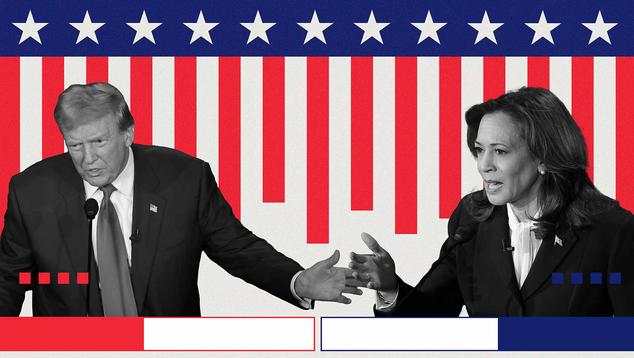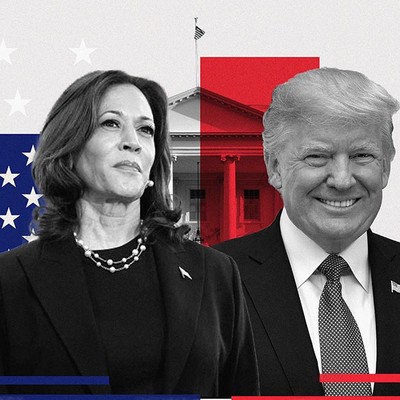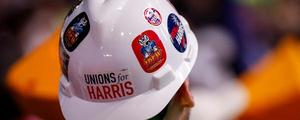Story Highlights
- Independents rate Trump better than Harris, 44% vs. 35%
- Walz, Vance each viewed favorably by about four in 10 U.S. adults
- Biden’s approval rating dips to 39% after last month’s 43% reading
WASHINGTON, D.C. -- Nearly identical percentages of U.S. adults rate Donald Trump (46%) and Kamala Harris (44%) favorably in Gallup’s latest Sept. 3-15 poll, during which the candidates debated for the first time. Both candidates, however, have higher unfavorable than favorable ratings. Trump’s unfavorable rating is seven percentage points higher than his favorable score, and Harris’ is 10 points higher.
Harris’ bump in favorability after her unexpected nomination as the Democratic presidential nominee has moderated somewhat, while Trump’s favorability is up five points since last month, returning to the level he was at in June.
Despite the overall negative tilt in favorability, both candidates enjoy nearly unanimous positive ratings from their own party faithful and negligible positivity from the opposing party. While majorities of independents view Trump and Harris unfavorably, the former president holds a favorability edge over the current vice president with the group -- 44% vs. 35%, respectively.
Presidential Candidates’ Favorability Below 50% for Third Consecutive Cycle
In the six consecutive presidential cycles starting in 1992, at least one of the candidates, and often both, received positive ratings from a majority of Americans in September of the election year and up until the election. However, since 2016 -- when Trump and Hillary Clinton were the least favorably viewed presidential candidates in the history of Gallup polling -- less than half of U.S. adults have rated the candidates positively in the summer and fall of the election year.
Trump is currently viewed better than he was at a similar point in the 2020 and 2016 campaigns, while Harris’ positive rating is on par with Biden’s in 2020 and well above Clinton’s in 2016. Beyond Trump, Clinton and Biden, only George H.W. Bush in 1992 and Mitt Romney in 2012 earned a favorable score of less than 50%.
Vice Presidential Candidates Still Unknown to About One in Five Americans
The vice presidential candidates’ favorable ratings are not yet as concrete as their running mates’ are. About one in five U.S. adults do not yet have an opinion of Democratic Minnesota Gov. Tim Walz (19%) or Republican Ohio U.S. Sen. JD Vance (17%). While Vance’s unfavorable rating (47%) outpaces his favorable rating (36%), Walz is viewed favorably (41%) and unfavorably (40%) by roughly equal shares of Americans.
Both vice presidential candidates receive largely favorable scores from their party base -- 79% of Democrats rate Walz positively, and 74% of Republicans have a favorable view of Vance. Independents have a more favorable opinion of Walz (37%) than Vance (30%), and this group is the most likely to say they have not yet formed an opinion of the presidential candidates’ running mates.
The overall favorable ratings for Walz and Vance are in line with those of other vice presidential candidates at a similar point in the campaign since 2012. Prior to 2012, favorable ratings of the presidential running mates in August or early September were generally higher, with at least one of the candidates garnering majority-level favorability.
Job Approval Ratings of Harris and Biden Down Slightly
The vice president’s current job approval rating matches her favorable rating, with 44% of Americans saying they approve. Last month, her approval rating was 47%. Harris’ current approval rating is 95% among Democrats, 38% among independents and 2% among Republicans.
After giving up his bid for the presidency in July, President Joe Biden enjoyed a boost in his approval rating to 43% last month -- which has slipped to 39%, not far from the 36% taken in the weeks leading up to his announcement that he would not seek reelection.
Democrats’ rating of Biden is 85%, independents’ is 31% and Republicans’ is 3%.
Bottom Line
Both presidential candidates continue to be viewed unfavorably by majorities of Americans. Should those evaluations hold through the end of the campaign, it would mark the third consecutive presidential campaign in which neither candidate garnered majority-level favorable ratings from the public. In most cases since 1992, when one of the presidential candidates was viewed significantly more favorably than the other, the higher-rated candidate won. The current similarity between Trump’s and Harris’ favorable ratings may be a sign of a tight race.
To stay up to date with the latest Gallup News insights and updates, follow us on X @Gallup.
Explore President Biden's approval ratings and compare them with those of past presidents in the Gallup Presidential Job Approval Center.
Learn more about how the Gallup Poll Social Series works.
View complete question responses and trends (PDF download).





